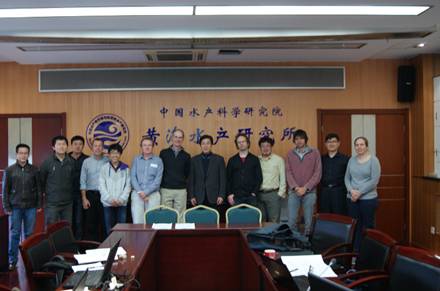The seventh meeting of the CCAMLR Subgroup on Acoustic Survey and Analysis Method (SG-ASAM-14) was held in Yellow Sea Fisheries Research Institute (YSFRI), Chinese Academy of Fishery Sciences (CAFS) from 8 to 11 April 2014. The meeting was convened by Dr J. Watkins (UK) and Prof. Zhao Xianyong, deputy director of YSFRI. A total of 14 representatives from the UK, Norway, Australia, Republic of Korea, Japan, China and the Secretary of CCAMLR had attended this meeting.
The work of SG-ASAM is currently focused on the use of fishing-vessel-based acoustic data to provide qualitative and quantifiable information on the distribution and relative abundance of Antarctic krill (Euphausia superba) and other pelagic species such as myctophiids and salps. Specifically, this meeting of SG-ASAM-14 was convened to determine protocols for collection and analysis of acoustic data collected on board fishing vessels. Scientists from YSFRI had actively participated in the discussion and data analysis during the meeting. Dr Zhao Xianyong had proposed a road map towards the full utilization of acoustic data collected from fishing vessels. The road map was agreed by the Subgroup and adopted in its report. Dr Wang Xinliang of YSFRI had presented his work on noise reduction on acoustic recordings from the fishing vessel, which had severe interference noise from other acoustic instruments. He also joined the preliminary analyses on seabed data echoes which was considered as an important external reference target for the acoustic calibration. The Subgroup thanked the contribution that Dr Wang had done to the work of CCAMLR. After 4 days of discussion, the Subgroup confirmed that any vessel with a functioning echo sounder had the potential to collect acoustic data and associated metadata required to provide information on the distribution and abundance of krill, and provided the recommendations including the transects locations, instruments settings and options for instruments calibration for the krill fishing vessels.
In closing the meeting, the Co-conveners thanked all participants for their contributions to the work of SG-ASAM and for the detailed discussions which had resulted in the further development of protocols for using fishing-vessel-based acoustic data. Dr Watkins also thanked Dr Zhao and Dr Jin (Director General, YSFRI) for the excellent meeting facilities and their generous hospitality.
The Scientific Committee for the Conservation of Antarctic Marine Living Resources (SC-CAMLR) has several expert Working Groups that meet annually, or as required by the Scientific Committee. This was the first CCAMLR related meeting held in China. The success of the meeting is a new mark on China’s active participation in the conservation of Antarctic marine living resources and its fishery management.
